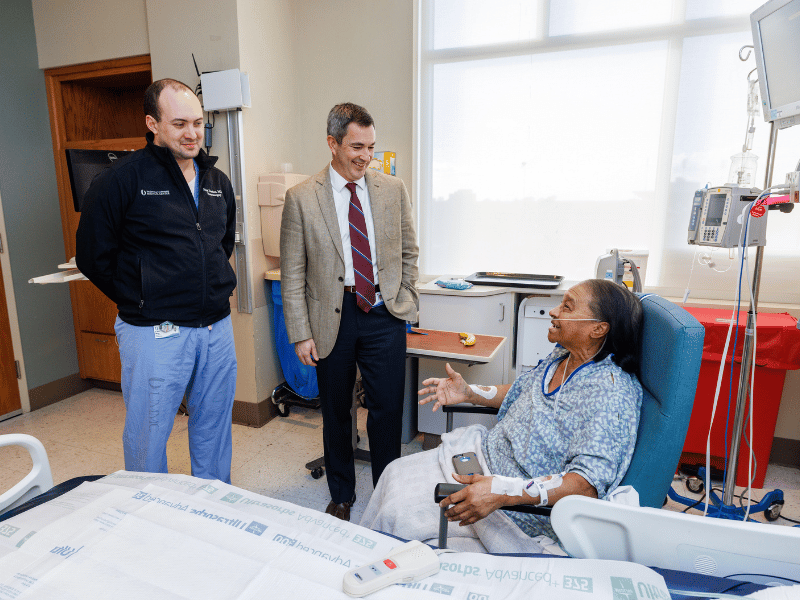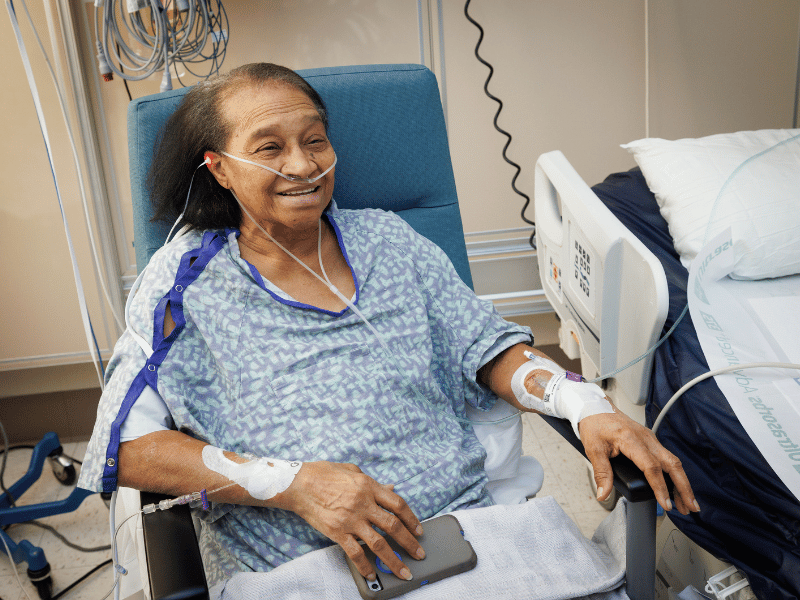UMMC stroke patient makes remarkable recovery

Quick thinking and being in the right place at the right time led to a life-preserving treatment and a miraculous recovery for a Clinton resident.
Mabel Bankston was with her husband, Curtis, a patient at Baptist Medical Center, when she found herself in need of immediate medical attention.
According to Bankston, her husband, who had a stroke nearly a year ago, was on his last day of therapy when he suffered a fall that broke his hip. While at the hospital for her husband’s surgery, Bankston said she suddenly began feeling unwell.

“I started feeling very strange,” said Bankston. “I sat down on the cot in his hospital room, and I was thinking ‘What is happening?’ The nurse came in to ask me a question, but I couldn’t really explain to her what she wanted to know. So, she asked me again.
All of a sudden, she tells me ‘You’ve got to go’ and I was thinking ‘Go where?’ because I thought that whatever it was would go back to normal soon.”
The rest, Bankston said, was a blur.
Before she fully understood what was happening, Bankston said she was on her way to UMMC Stroke Center where she would undergo emergency surgery. “I got in the ambulance and I’m thinking ‘Why am I leaving the hospital?’ Then they turned into here [University of Mississippi Medical Center] and I thought ‘I must be mighty sick.’”
Certified as a Primary Stroke Center since 2014, UMMC achieved certification from The Joint Commission as a Comprehensive Stroke Center in 2023—making it one of only two hospitals in the state with this level of recognition.
Dr. Chad Washington, chair of neurosurgery and director of UMMC Stroke Center, said Bankston’s case is exceedingly rare. “This is the kind of recovery you typically only see in TV shows,” he said.
“She presented to UMMC unable to speak, actively having a stroke,” he said. “We measure stroke severity using the NIH [National Institutes of Health] Stroke Scale, and Mrs. Bankston’s score was a 12 out of 42. Untreated, a person with this degree of dysfunction will be left with significant neurological deficits and disability.
“What was amazing about her case is that after treatment she recovered to being completely normal in less than 24 hours with a NIHSS of zero out of 42. This is a phenomenal outcome when considering other patients presenting in her condition.”
![Bankston smiles, surrounded by her [from left] cousin and UMMC nurse, Andrealisa Johnson; niece, Trina Patton Toles; and surgeons, Dr. Nick Derrico and Dr. Chad Washington.](/News/News_Articles/2024/01/images/Mabel-Bankston-Stroke-Patient_08.png)
In large studies evaluating the results of endovascular treatments for stroke, only about 10% of patients will be neurologically normal to near normal at three months. Less than 1% of patients will be normal within 24 hours, Washington said.
He attributes her remarkable recovery, in part, to how quickly she was able to be treated. He urged that time is everything when it comes to someone having a stroke.
“Most people think ‘Oh, it will get better’ and ignore it,” said Washington. “It’s important for people having stroke symptoms to recognize those symptoms and get to the emergency room as fast as possible. If you notice someone else exhibiting symptoms, call 911.
The benefit of UMMC being a TJC Comprehensive Stroke Center to Mrs. Bankston and patients like her, is the comprehensive team of health care providers committed to providing stroke patients effective treatment as rapidly as possible.
“We have spent innumerable hours evaluating our processes from a patient’s arrival to discharge to ensure that patient gets the absolute best care possible. The result of these efforts meant that Mrs. Bankston’s endovascular treatment started within 30 minutes of her arrival to UMMC, and that the blood clot was removed within one hour,” Washington said.
It’s important to note the signs of a stroke. Individuals suffering from a stroke may exhibit symptoms such as loss of balance, loss of vision, face drooping, arm weakness or difficulty speaking. One of the eight southeastern states that make up the “stroke belt,” Mississippi has led the nation in its number of stroke-related deaths per year since 2017.
“I think that the awareness really needs to be out there,” said Bankston. “I’m sure that if I had been at home, I probably wouldn't have come immediately to the hospital. I would have sat there trying to figure out what was going on with me. It is very important to act fast.
“What happened to my husband was probably just that. He lost physical ability and a lot of his cognitive skills. That’s what happens to a lot of people and that’s what would have happened to me if I had been at home. I would have waited.”
For more information about stroke prevention and treatment at the UMMC Comprehensive Stroke Center, visit umc.edu/stroke.


